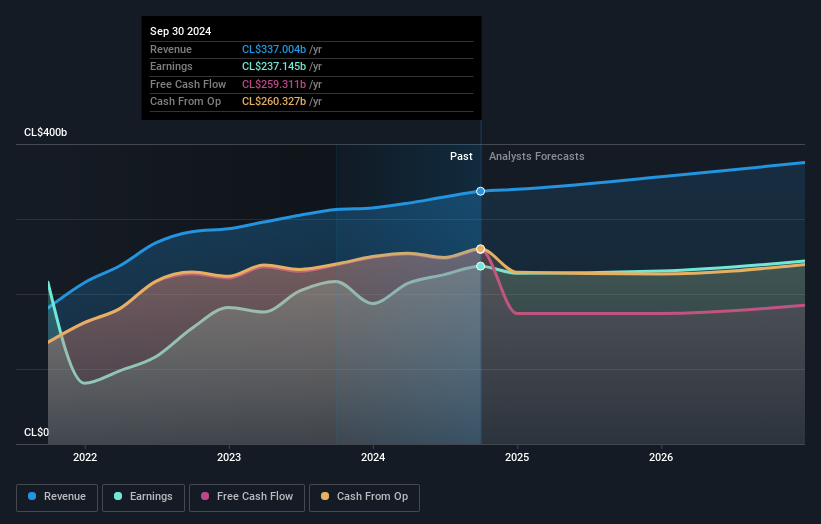- Chile
- /
- Real Estate
- /
- SNSE:CENCOMALLS
Public companies account for 72% of Cencosud Shopping S.A.'s (SNSE:CENCOMALLS) ownership, while institutions account for 17%

Key Insights
- Cencosud Shopping's significant public companies ownership suggests that the key decisions are influenced by shareholders from the larger public
- Cencosud S.A. owns 72% of the company
- 17% of Cencosud Shopping is held by Institutions
Every investor in Cencosud Shopping S.A. (SNSE:CENCOMALLS) should be aware of the most powerful shareholder groups. And the group that holds the biggest piece of the pie are public companies with 72% ownership. That is, the group stands to benefit the most if the stock rises (or lose the most if there is a downturn).
And institutions on the other hand have a 17% ownership in the company. Insiders often own a large chunk of younger, smaller, companies while huge companies tend to have institutions as shareholders.
Let's delve deeper into each type of owner of Cencosud Shopping, beginning with the chart below.
View our latest analysis for Cencosud Shopping

What Does The Institutional Ownership Tell Us About Cencosud Shopping?
Institutional investors commonly compare their own returns to the returns of a commonly followed index. So they generally do consider buying larger companies that are included in the relevant benchmark index.
Cencosud Shopping already has institutions on the share registry. Indeed, they own a respectable stake in the company. This implies the analysts working for those institutions have looked at the stock and they like it. But just like anyone else, they could be wrong. If multiple institutions change their view on a stock at the same time, you could see the share price drop fast. It's therefore worth looking at Cencosud Shopping's earnings history below. Of course, the future is what really matters.

We note that hedge funds don't have a meaningful investment in Cencosud Shopping. The company's largest shareholder is Cencosud S.A., with ownership of 72%. With such a huge stake in the ownership, we infer that they have significant control of the future of the company. For context, the second largest shareholder holds about 4.4% of the shares outstanding, followed by an ownership of 3.4% by the third-largest shareholder.
While studying institutional ownership for a company can add value to your research, it is also a good practice to research analyst recommendations to get a deeper understand of a stock's expected performance. There are plenty of analysts covering the stock, so it might be worth seeing what they are forecasting, too.
Insider Ownership Of Cencosud Shopping
The definition of company insiders can be subjective and does vary between jurisdictions. Our data reflects individual insiders, capturing board members at the very least. The company management answer to the board and the latter should represent the interests of shareholders. Notably, sometimes top-level managers are on the board themselves.
I generally consider insider ownership to be a good thing. However, on some occasions it makes it more difficult for other shareholders to hold the board accountable for decisions.
Our data cannot confirm that board members are holding shares personally. It is unusual not to have at least some personal holdings by board members, so our data might be flawed. A good next step would be to check how much the CEO is paid.
General Public Ownership
With a 12% ownership, the general public, mostly comprising of individual investors, have some degree of sway over Cencosud Shopping. While this group can't necessarily call the shots, it can certainly have a real influence on how the company is run.
Public Company Ownership
It appears to us that public companies own 72% of Cencosud Shopping. We can't be certain but it is quite possible this is a strategic stake. The businesses may be similar, or work together.
Next Steps:
While it is well worth considering the different groups that own a company, there are other factors that are even more important. To that end, you should be aware of the 2 warning signs we've spotted with Cencosud Shopping .
If you would prefer discover what analysts are predicting in terms of future growth, do not miss this free report on analyst forecasts.
NB: Figures in this article are calculated using data from the last twelve months, which refer to the 12-month period ending on the last date of the month the financial statement is dated. This may not be consistent with full year annual report figures.
New: AI Stock Screener & Alerts
Our new AI Stock Screener scans the market every day to uncover opportunities.
• Dividend Powerhouses (3%+ Yield)
• Undervalued Small Caps with Insider Buying
• High growth Tech and AI Companies
Or build your own from over 50 metrics.
Have feedback on this article? Concerned about the content? Get in touch with us directly. Alternatively, email editorial-team (at) simplywallst.com.
This article by Simply Wall St is general in nature. We provide commentary based on historical data and analyst forecasts only using an unbiased methodology and our articles are not intended to be financial advice. It does not constitute a recommendation to buy or sell any stock, and does not take account of your objectives, or your financial situation. We aim to bring you long-term focused analysis driven by fundamental data. Note that our analysis may not factor in the latest price-sensitive company announcements or qualitative material. Simply Wall St has no position in any stocks mentioned.
About SNSE:CENCOMALLS
Cencosud Shopping
Operates shopping centers in Chile, Peru, and Colombia.
Adequate balance sheet with acceptable track record.
Market Insights
Community Narratives




